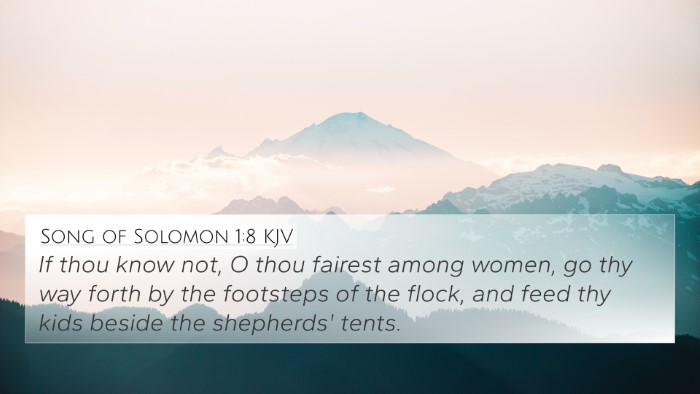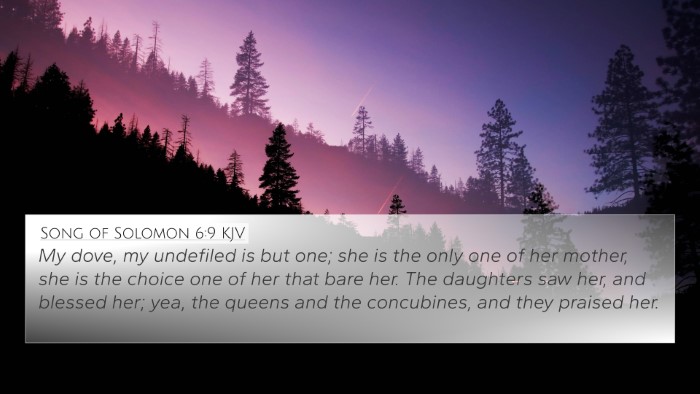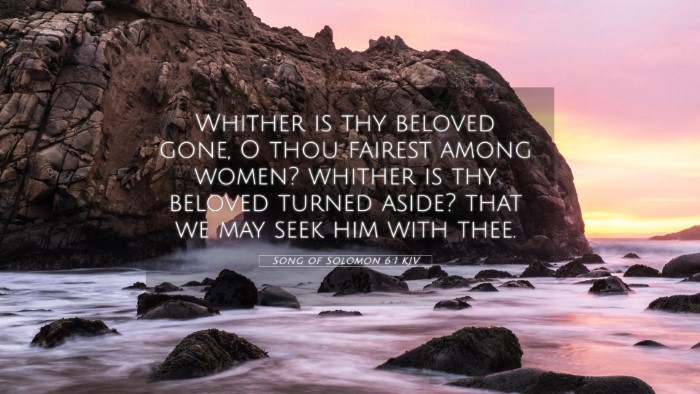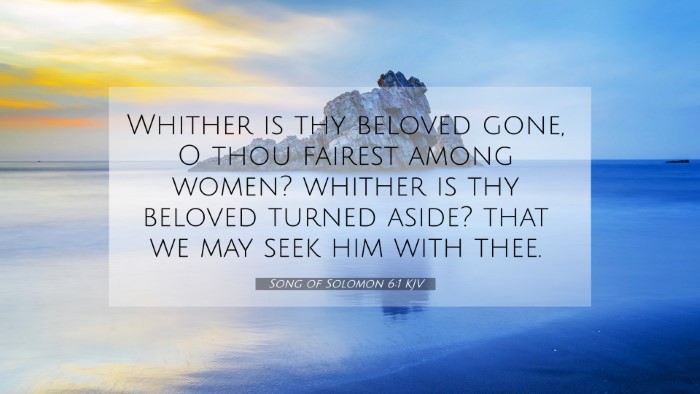Old Testament
Genesis Exodus Leviticus Numbers Deuteronomy Joshua Judges Ruth 1 Samuel 2 Samuel 1 Kings 2 Kings 1 Chronicles 2 Chronicles Ezra Nehemiah Esther Job Psalms Proverbs Ecclesiastes Song of Solomon Isaiah Jeremiah Lamentations Ezekiel Daniel Hosea Joel Amos Obadiah Jonah Micah Nahum Habakkuk Zephaniah Haggai Zechariah MalachiSong of Solomon 6:1 Similar Verses
Song of Solomon 6:1 Cross References
Whither is thy beloved gone, O thou fairest among women? whither is thy beloved turned aside? that we may seek him with thee.
Uncover the Rich Themes and Topics of This Bible Verse
Listed below are the Bible themes associated with Song of Solomon 6:1. We invite you to explore each theme to gain deeper insights into the Scriptures.
Song of Solomon 6:1 Cross Reference Verses
This section features a detailed cross-reference designed to enrich your understanding of the Scriptures. Below, you will find carefully selected verses that echo the themes and teachings related to Song of Solomon 6:1 KJV. Click on any image to explore detailed analyses of related Bible verses and uncover deeper theological insights.

Song of Solomon 1:8 (KJV) »
If thou know not, O thou fairest among women, go thy way forth by the footsteps of the flock, and feed thy kids beside the shepherds' tents.

Song of Solomon 5:9 (KJV) »
What is thy beloved more than another beloved, O thou fairest among women? what is thy beloved more than another beloved, that thou dost so charge us?

Song of Solomon 6:9 (KJV) »
My dove, my undefiled is but one; she is the only one of her mother, she is the choice one of her that bare her. The daughters saw her, and blessed her; yea, the queens and the concubines, and they praised her.

Jeremiah 14:8 (KJV) »
O the hope of Israel, the saviour thereof in time of trouble, why shouldest thou be as a stranger in the land, and as a wayfaring man that turneth aside to tarry for a night?

Song of Solomon 1:4 (KJV) »
Draw me, we will run after thee: the king hath brought me into his chambers: we will be glad and rejoice in thee, we will remember thy love more than wine: the upright love thee.

Ruth 2:12 (KJV) »
The LORD recompense thy work, and a full reward be given thee of the LORD God of Israel, under whose wings thou art come to trust.

Song of Solomon 6:4 (KJV) »
Thou art beautiful, O my love, as Tirzah, comely as Jerusalem, terrible as an army with banners.

Song of Solomon 5:6 (KJV) »
I opened to my beloved; but my beloved had withdrawn himself, and was gone: my soul failed when he spake: I sought him, but I could not find him; I called him, but he gave me no answer.

Ruth 1:16 (KJV) »
And Ruth said, Entreat me not to leave thee, or to return from following after thee: for whither thou goest, I will go; and where thou lodgest, I will lodge: thy people shall be my people, and thy God my God:

Zechariah 8:21 (KJV) »
And the inhabitants of one city shall go to another, saying, Let us go speedily to pray before the LORD, and to seek the LORD of hosts: I will go also.
Song of Solomon 6:1 Verse Analysis and Similar Verses
Understanding Song of Solomon 6:1
Bible Verse: Song of Solomon 6:1 - "Where has your beloved gone, O most beautiful among women? Where has your beloved turned, that we may seek him with you?"
Overview of the Verse
This verse from the Song of Solomon represents a dialogue that highlights the longing for the beloved and the collective desire to seek him. It reflects themes of love, beauty, and the quest for connection.
Commentary Insights
Matthew Henry's Commentary
Matthew Henry emphasizes the beauty of the beloved and the communal yearning of the women who seek him. He interprets the line as an expression of the church’s desire for Christ, wherein the beauty of the relationship is evident. The beloved's absence suggests a search for deeper intimacy, and the collective voice signifies an encouragement to seek spiritual closeness.
Albert Barnes' Notes
Albert Barnes notes the rhetorical nature of the question posed in the verse. He suggests that the ‘beloved’ symbolizes Christ and His church. The inquiry implies that the search for Christ is a communal effort, with believers encouraging one another in their spiritual journeys. Barnes also highlights how the quest for the beloved portrays the spiritual longing of believers.
Adam Clarke's Commentary
Adam Clarke elaborates on the implications of 'most beautiful among women,' describing it as a reference to the Church or the soul in relation to Christ. He posits that this verse alludes to the unity in seeking Christ, with an emphasis on the importance of companionship in faith journeys to discover divine love and truth.
Thematic Bible Verse Connections
This verse can be connected thematically to various other Biblical passages that explore themes of love, pursuit, and spiritual longing:
- Psalms 42:1-2: "As the deer pants for streams of water, so my soul pants for you, my God."
- Proverbs 8:17: "I love those who love me, and those who seek me find me."
- John 14:21: "Whoever has my commands and keeps them is the one who loves me."
- Matthew 7:7: "Ask, and it will be given to you; seek, and you will find; knock, and it will be opened to you."
- James 4:8: "Draw near to God, and he will draw near to you."
- Isaiah 26:9: "For when your judgments are in the earth, the inhabitants of the world learn righteousness."
- Revelation 22:17: "The Spirit and the bride say, 'Come!' And let the one who hears say, 'Come!'"
Cross-References for Deeper Study
To further explore the connections within the scripture, consider these cross-references:
- Song of Solomon 1:7: "Tell me, you whom my heart loves, where you graze your flock."
- John 10:27: "My sheep hear my voice, and I know them, and they follow me."
- Matthew 12:30: "Whoever is not with me is against me, and whoever does not gather with me scatters."
Conclusion
In conclusion, Song of Solomon 6:1 serves as a beautiful reminder of the dynamic between believers and Christ, reflecting both individual and collective longing. The interconnectedness of this verse with others illustrates the deep relational call throughout scripture to pursue divine love and intimacy. Through understanding these connections, believers can engage in a more profound spiritual journey.
Tools for Bible Cross-Referencing
Utilizing various tools can enhance the study of cross-references in scriptures:
- Bible Concordance: A comprehensive tool to find specific words and themes across the Bible.
- Bible Cross-Reference Guide: Helps locate verses that connect thematically or contextually.
- Bible Cross-reference System: A methodical approach to studying Biblical texts in relation to each other.
- Cross-reference Bible study: A structured study technique to discover scriptural links.
Final Thoughts
In exploring Song of Solomon 6:1, we see the beauty of scriptural connections and the importance of seeking out these links for a richer understanding of the divine narrative. Engaging with the Bible through cross-referencing illuminates the ongoing dialogue between its texts and augments the spiritual journey.





